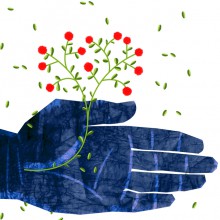Recently I have learned that there are so-called “blue zones” in the world – regions of the planet, marked by unusual longevity of the inhabitants. The interesting account of that can be found in Dan Buettner’s book entitled The Blue Zones, Second Edition: 9 Lessons for Living Longer from the People Who’ve Lived the Longest, the fragments of which I encountered on the web.
These “blue zones” are: Okinawa Prefecture in Japan, Sardinia island, Nicoya peninsula, and one religious community in California. In addition to common ethical and life habits, scientists noticed similarities in the diet shared by the inhabitants of these areas. Almost all of them comply to moderate consumption of meat or even completely abandon it. The basis of the centenarians’ diet is beans, grains, and vegetables.
This interesting fact, which has been confirmed by many studies, might become another incentive to join the International Day Without Meat, which has been celebrated on March 20 since 1985.
In some countries, for example Sri Lanka, this day has official status. In other countries there are grassroots initiatives to withdraw meat products from sale once a year, on March 20.
For me, it’s a helpful practice – change the usual diet at least once a year and make my “life line” a little bit longer.







